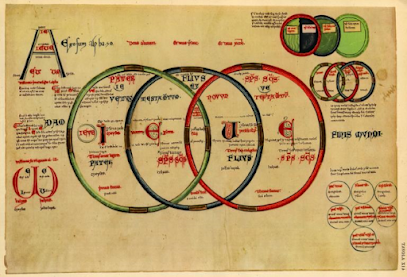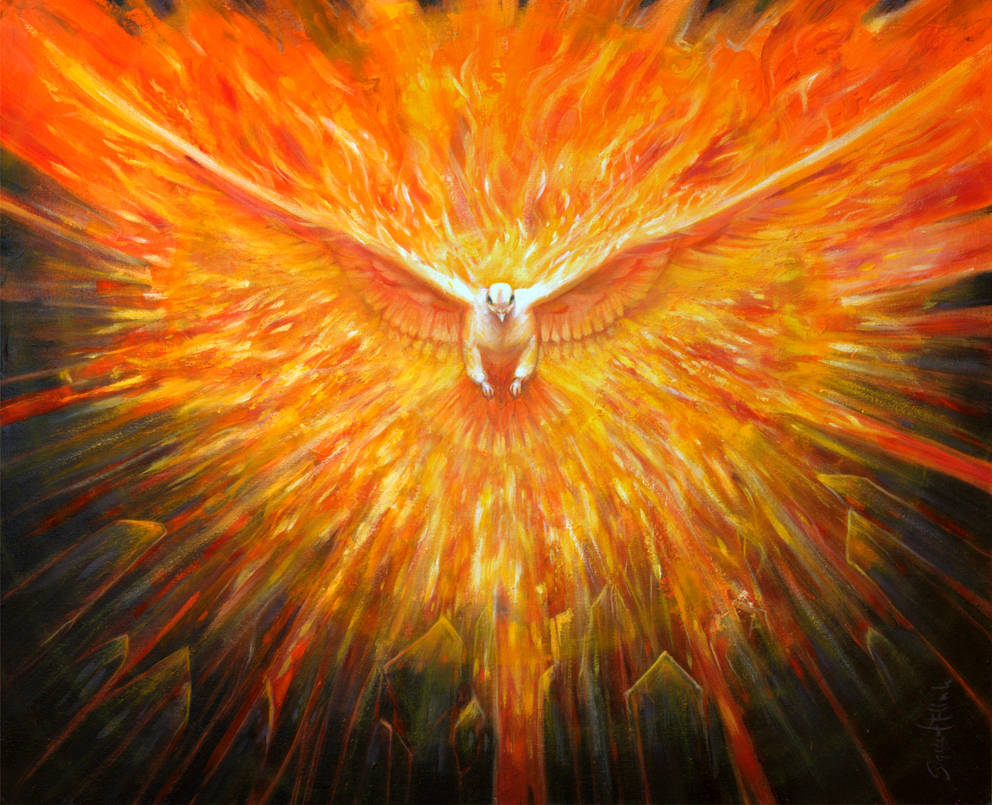The concept of a "New Era" has captivated thinkers and theologians for centuries, with its roots deeply embedded in apocalyptic and millennialist thought. A pivotal figure in shaping Western perceptions of the future is Joachim of Fiore, a 12th-century Italian abbot whose theories profoundly influenced ideas of history, progress, and societal transformation. Moreover, some authors have analysed Joachim's framework of the Three Ages (status), with a particular focus on the anticipated Age of the Holy Spirit, and have explored how these themes resonate with the philosophy of Giordano Bruno, a Renaissance figure who envisioned his own kind of transformation.
Joachim of Fiore, the Three Ages and The Age of the Holy Spirit
Joachim of Fiore introduced a dynamic interpretation of history, diverging from the more static Augustinian view that dominated medieval thought. He proposed a model of the Three Ages (status), each linked to a person of the Holy Trinity, thereby providing a theological framework for historical evolution.
The first age, the Age of the Father, corresponded to the Old Testament, the Kingdom of Israel, and the reign of the flesh. This was a period characterised by a more materialistic and worldly existence. The second age, the Age of the Son, began with the incarnation of Christ and represented a period of struggle between flesh and spirit.
However, it would be the third age, the Age of the Holy Spirit, that would hold the promise of radical change and ultimate transformation of the world. This would be an era of spiritual renewal and purity, where the humankind would reject its worldly power, and the faithful would live directly under the guidance of the Holy Spirit. The age would be marked by Unity among all people, Christians, Jews and Muslims etc, who would come together. This age would be a time of Peace, Prosperity, and Harmony, fulfilling God’s Plan for Humanity. The Age of the Holy Spirit would be transformative, correcting the corruptions and injustices that had plagued our world.
Joachim envisioned the Age of the Holy Spirit as an era of profound transformation. He prophesied the rectification of society's corruption, with a return to the purity of Christ's teachings. The Universal Unity would be restored, and even other faiths would find Harmony within a Universal Spiritual Understanding. This new age would be characterised by genuine Peace and widespread Prosperity, lasting until the end of the world.
Central to this progress was the rise of "spiritual men," who would be active in the world, embodying Christ's teachings through service and compassion. Joachim foresaw new ascetic orders that would synthesise contemplation and action, driving the transformation of the world.
Furthermore, Joachim's vision included the unveiling of new, previously unknown Spiritual Truths, facilitated by the development of "spiritual intelligence" in humanity. This would lead to an evolution of humankind, moving away from hierarchy and towards egalitarianism and communal living. In essence, Joachim painted a picture of a future characterised by social Justice, spiritual Enlightenment, and continuous Progress, accessible to all people.
Finally, the transition to the Age of the Holy Spirit, however, wouldn't be seamless. Joachim predicted a period of tribulation and upheaval, a necessary "cleansing" of the old order. This era of tribulation, while difficult, was seen as a necessary prelude to the coming Peace and Justice.
Echoes of transformation: Giordano Bruno and the Renaissance
While separated by centuries, the themes of transformation and a new era found resonance in the philosophy of Giordano Bruno. This Renaissance philosopher and cosmologist challenged the established order of his time with his heliocentric worldview and his vision of an infinite universe. Like Joachim, Bruno envisioned a shift in understanding and a move away from the limitations of the old world.
Furthermore, Bruno's final moments were marked by a profound dialogue with his disciple Sagredo. The philosopher reflected on history's frequent marking by death rather than life, noting that an illustrious death often provokes fear, disquiet, and inquiry. This realization brought him peace, as he understood himself to be fulfilling his destiny. When Sagredo expressed concern about the impending flames, Bruno admitted his physical fear but asserted his spiritual immortality. He envisioned witnessing his own body's demise and the reactions of his persecutors. Moreover, Bruno lamented the illusions and ignorance that plague humanity, asserting that unhappiness, stemming from the limitations of the human mind, rather than inherent evil, is the root cause of suffering.
The philosopher described this fate as common to all those who seek the Truth in a world governed by falsehood. He also prophesied a future awakening for humanity, a realization of their true nature and a rejection of the deceptive forces that enslave them. He declared humanity's boundless potential and the eventual attainment of freedom in this world. Turning to Sagredo with an almost radiant expression, he affirmed that Life had foreseen this freedom since ancient times. Then, in response to Sagredo's questioning of this cruel destiny, Bruno stated that he himself had chosen it before his earthly existence. He described the fiery death of the physical body as a profound purification, a Baptism of Fire chosen by many, both as an example to a misguided humanity and to fulfill a divinely appointed task undertaken out of Love. He posited that even his death would unveil the hidden power structures behind all worldly authorities. In an illusory realm dominated by deceit, hypocritical virtue, and fear, an illustrious death, he argued, holds more power than a lifetime, etched in human memory. Besides, Bruno characterised Earth as a rigorous learning environment where every action leaves an indelible mark, asserting the existence of True Justice, even if unseen in the present world.
Then, when Sagredo questioned if True Justice demanded his death, Bruno replied that it was willed by their true, immortal selves, not their transient physical forms. He stated that beings are ultimately the architects of their own experiences. The true Self, he explained, does not fear death, recognizing its illusory nature. Birth into this world brings about a sensory deception, a belief in appearances, and an ignorance of our innate blindness and deafness. We are, he declared, children of the singular, True Sun that illuminates all worlds. In addition, Bruno foresaw a coming New Era on Earth where death would be understood as non-existent, and misery and suffering would be recognised as products of fear and ignorance of true reality. Some Celestial Beings, he asserted, watch over Earth's development, and some are born into the world to aid humanity in understanding that transformation hinges on their awakening. Sagredo was profoundly impacted, gaining insight into previously unknown truths. Bruno continued, explaining that the "Baptism of Fire" serves to transmute the physical body and reveal the true, immortal Beings. He deemed their unveiling inevitable, though the timing remained uncertain. He knew that many had come in their era to advance arts and sciences, planting the seeds of a new culture that would blossom unexpectedly, precisely when the established powers believed they had triumphed. In the end, Bruno concluded by assuring Sagredo that they were not truly separating, for separation is an illusion, and all beings are eternally connected to the One Soul.
Characteristics of the New Era
This New Era, the Third Age of the Holy Spirit, emerging from this period of transition, would be characterised by several key features:
· Spiritual Renewal: The mankind would be purified, focusing on spiritual guidance rather than worldly power.
· Social Justice: Society would become more egalitarian, with a focus on communal living and mutual service.
· Universal Peace: Conflict and division would give way to Harmony and understanding between peoples and faiths.
· Progress and Evolution: Humanity would experience continuous spiritual and intellectual growth, with new Truths being revealed over time.
· Emphasis on Transformation: Both thinkers, in their respective contexts, saw the need for a radical shift away from the limitations of the old world.
· Human Potential: Both expressed a belief in the untapped potential of humanity. Joachim's "spiritual intelligence" and Bruno's emphasis on expanding human understanding resonate with this idea.
_______________________________________________
References:
https://www.patheos.com/blogs/innewestdays/2023/09/joachim-of-fiore-the-man-who-invented-the-future/
“La futura scienza di Giordano Bruno e la nascita dell’uomo nuovo” di Giuliana Conforto.






